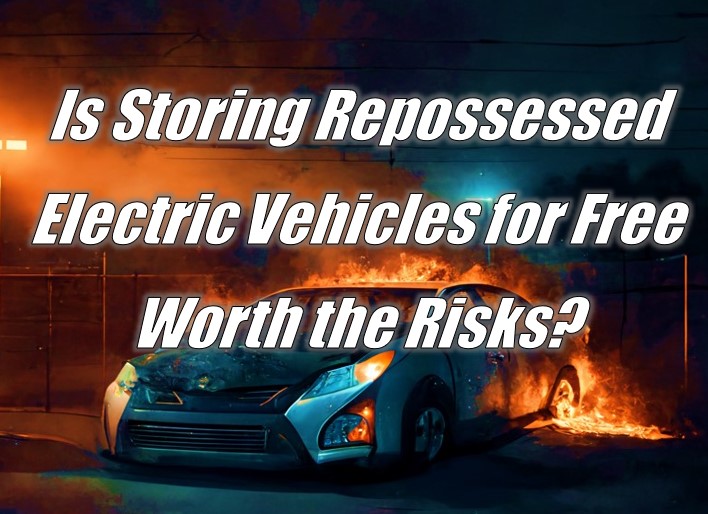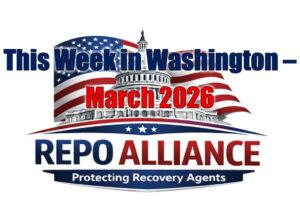EDITORIAL
Earlier this month, the National Highway Traffic Safety Administration (NHTSA) shared a recall issued by Chrysler on more than 154,000 plugin and hybrid vehicles due to risk of fire while parked or driven. While this is the largest EV recall for this reason, the same risk exists on many other damaged batteries. Considering the volatility of these vehicles and how one fire could wipe out a repossession agency, is repossessing or storing them even worth it?
With the expansion of EV powered vehicles on the market, there comes a growing increase in the numbers of them being repossessed. And with these vehicles consuming more and more storage space in tow yards, there is increased risk of battery failures that can utterly destroy a business in minutes. With the recent recall of more than 154,000 EV Jeeps, we are only now just beginning to see how prevalent this risk is and why free storage is far from free.
As mentioned, the National Highway Traffic Safety Administration (NHTSA) shared a recall issued by Chrysler that announced that more than 154,000 plugin and hybrid vehicles due to fire risk posed by problems with charging modules or the batteries themselves. They also mention allegations that at least two people have been injured.
As a cautionary measure, they are suggesting that owners should park their vehicles outside and away from structures and other vehicles until their vehicle has been remedied. In addition, owners should not charge unrepaired vehicles, because the risk of fire is higher in a charged battery and the risk of fire is reduced when the battery is depleted.
So, how much space around one of these vehicles must be maintained for any reasonable measure of safety? A lot more than most agencies have room for. Compounding this logistical waste of storage room is the issue of free vehicle storage fees by lenders/forwarders.
It’s like insult to injury for agency owners to be expected to not only receive no storage fees, but when a potential fire hazard is the vehicle, how is this even supposed to be considered financially feasible considering the risk?
Below is the NHTSA press release addressing the issue.
###
Consumer Alert: Important Jeep Grand Cherokee and Jeep Wrangler PHEVs “Park Outside” Recall for Fire Risk
Owners should park their vehicles outside and not charge them until they are repaired
October 1, 2024 | Washington, DC
Chrysler has issued a new recall for more than 154,000 model year 2020-2024 Jeep Wrangler plug-in hybrid electric vehicles and model year 2022-2024 Jeep Grand Cherokee plug-in hybrid electric vehicles due to a risk of fire while parked or driven.
Owners should park their vehicles outside and away from structures and other vehicles until their vehicle has been remedied. In addition, owners should not charge unrepaired vehicles, because the risk of fire is higher in a charged battery and the risk of fire is reduced when the battery is depleted.
The recall affects 118,230 Jeep Wrangler PHEVs and 35,802 Jeep Grand Cherokee PHEVs. There have been two alleged injuries reported to date. The affected vehicles may have been built with a high voltage battery that may fail internally.
To fix the issue, Chrysler dealers will update the battery pack control module software. Dealers will also inspect and, if necessary, replace the high-voltage battery.
Owners can expect to be notified by mail starting Oct. 17 and can contact Chrysler customer service at 800-853-1403. The NHTSA recall numbers are 24V-720 and 24E-080.
Owners can also visit NHTSA.gov/recalls or call NHTSA’s Vehicle Safety Hotline at 888-327-4236 and enter their license plate number or 17-digit vehicle identification number to see if their vehicle is under recall. NHTSA also encourages everyone to download its SaferCar app to stay informed on current recalls.
Contact:
NHTSA
NHTSA Media[email protected]
Source: NHTSA
###
We’ve known about the risks of E-vehicle storage for years now and some agencies have already been storing them separate from the rest of their stored vehicles. Considering the additional safety measures required to maintain them safely, it seems only fair that the agencies would be paid additional fees, but I’m unaware of any uniform paid fees for such.
In the long run, every agency owner must make business decisions for themselves. For every reward, there is risk. But I at very least cannot understand why anyone would even accept one of the aforementioned vehicles for repossession. And while the Chrysler/Jeep products are the only ones reported, this is a risk that exists with all EV’s and it seem imprudent for agencies to not demand additional storage fees to accommodate this risk.
Kevin Armstrong
Publisher
Related Articles:
The Deadly Danger in EV Repossessions
Lot Storage: The Developing Problem – Webinar
ARA Continuing Education Webinar Series











More Stories
Colorado Bill Aims to Severely Impact All Repossession Operations
Today is Fallen Agents Day – 2026
From Auction Cutting to Field Programming: The Structural Shift No One Budgeted For
Bad Apples in the Repossession Industry
Why Self-Help Repossession Is Taken for Granted — and Why Losing It Would Hurt Consumers Most
A Necessary Distinction: Financial Oversight vs. Financial Control